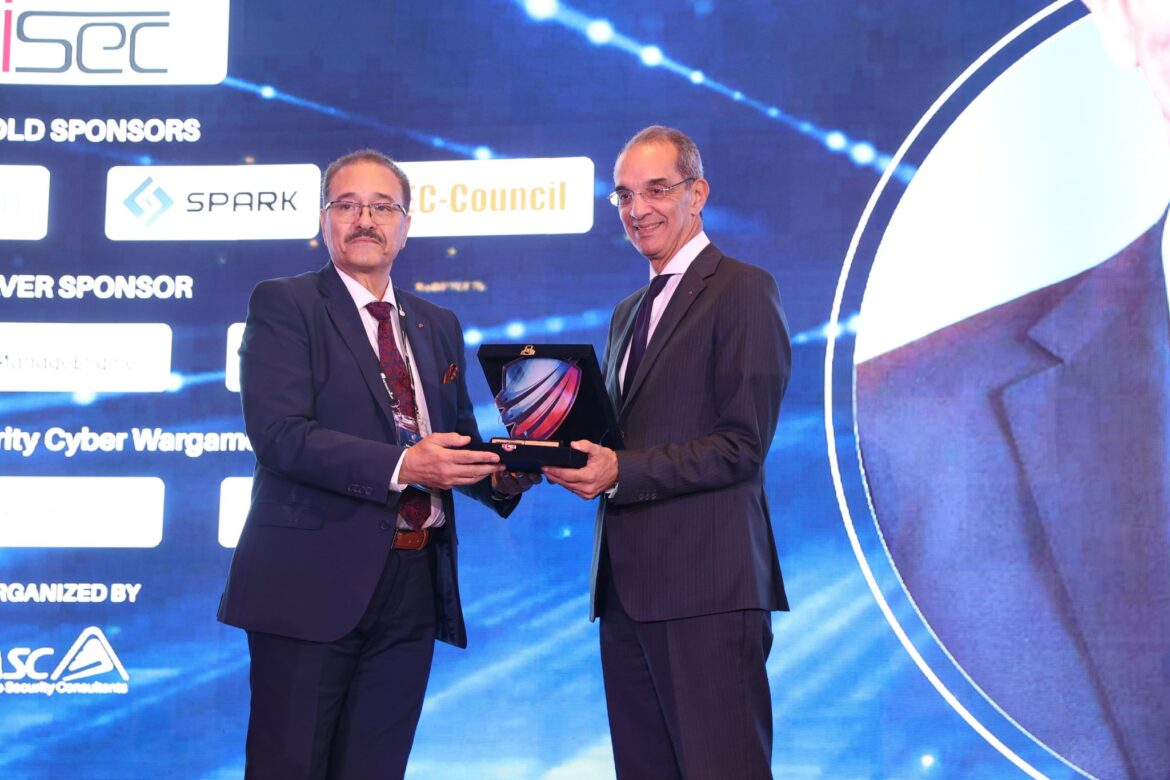In his remarks, the ICT Minister highlighted the importance of advancing joint Arab action in the field of cybersecurity through cooperation in training, information exchange, cyber incident response coordination, and the development of Arab-led research and innovation mechanisms to support Arab startups. He commended ongoing efforts to introduce regional awareness initiatives aimed at educating Arab citizens, thus reinforcing collective endeavors to safeguard the Arab digital space.
Talaat remarked that the Conference is taking place amid unprecedented technological transformations worldwide, permeating all aspects of daily life and extending their impact across different sectors. He explained that the rapid development and widespread adoption of digital applications have caused new cyber challenges, particularly as countries move toward adopting integrated digital economies, automating their services, introducing Artificial Intelligence (AI) into institutional management, and interconnecting their sectors through advanced cross-border digital infrastructures. He also stressed that greater reliance on technology inevitably leads to greater cyber threats.
Furthermore, the ICT Minister explained that cyberattacks extend beyond targeting systems to threaten citizens’ trust, state sovereignty, and sectoral stability. He referred to international reports indicating that the world faces a ransomware attack every 11 seconds, with more than 300 million individuals exposed to cyberattacks in 2023. The global cybercrime cost, he added, is estimated at around USD 9.5 trillion in 2024 alone, reflecting an annual increase exceeding 15%.

Moreover, Talaat outlined the five key pillars of Egypt’s National Cybersecurity Strategy (2023-2027), crafted by the Egyptian Supreme Cybersecurity Council (ESCC). These pillars include developing legislative and institutional framework through updating legislations and strengthening the regulatory powers of relevant authorities; promoting societal awareness by raising public understanding of cyberspace risks and fostering a culture of digital protection among citizens; strengthening cyber defenses by establishing cyber incident response centers, upgrading state infrastructure systems, and introducing initiatives to secure supply chain; encouraging research and innovation by supporting centers of excellence and advancing scientific research in encryption, cyber monitoring, and secure technologies; and enhancing regional and international cooperation through active engagement in shaping international standards, signing bilateral and multilateral agreements, and exchanging technical information and expertise.
Moreover, the ICT Minister highlighted the acute global shortage of cybersecurity specialists, with global estimates indicating more than 3.5 million unfilled positions in the field. He underlined the Ministry of Communications and Information Technology’s (MCIT) commitment to expanding cybersecurity capacity-building programs in collaboration with all state institutions, the private sector, and civil society.

These programs, he stated, target various segments of society and the state’s administrative apparatus to enhance cybersecurity awareness. He also emphasized the launch of numerous specialized training programs in cybersecurity to develop a pool of highly qualified professionals capable of securing cyberspace across all state sectors, particularly priority vital ones.
In addition, Talaat pointed out that the Egyptian team claimed first place in the Global CyberDrill 2025, held a few months ago during the 14th Gulf Information Security Expo and Conference (GISEC 2025) in the United Arab Emirates (UAE), outperforming teams from 138 countries.

For his part, Chairman and Founder of the Arab Security Conference Bahaa Mohamed Hassan underscored that the event stands out not only for its diverse agenda covering the latest issues associated with cyberspace but also for its role as a vital platform for dialogue, cooperation, and expertise exchange among Arab countries and international experts. With cybercrimes increasingly becoming transcontinental, he noted, the Conference plays a pivotal role in shaping a shared vision to bolster digital security and advance the development trajectory of Arab states.
Over the past nine years, Hasan highlighted, the Conference has achieved remarkable milestones, leaving a tangible impact on building national cybersecurity capacities. Through its scientific sessions, diverse activities, and specialized workshops, the event contributed to preparing a generation of young experts who have now become a mainstay for state institutions and various sectors, including banks and service providers, thus enhancing the country’s readiness to confront escalating cyber challenges.
It is worth noting that the current round of the Conference sheds light on the latest global trends in leveraging AI to address cyber threats and reinforce digital protection systems. Its agenda includes specialized panel discussions on industrial cybersecurity, cybercrime, digital identity protection, big data security, and strategies for safeguarding critical infrastructure.

Additionally, the event features the launch of the Arab Security Cyber Wargames Championship, which simulates real-world cyberattack scenarios with the participation of specialized teams from leading institutions and companies.
The Conference’s opening ceremony was attended by Director of the National Telecommunication Institute (NTI) Ahmed Khattab, Sub-Governor for Cybersecurity at the Central Bank of Egypt (CBE) Sherif Hazem Nour Eldin, and NTRA Vice President for Cybersecurity Affairs Walid Zakaria. They were joined by several decision-makers, Arab and international experts, senior diplomats, and representatives of regional and international organizations.


